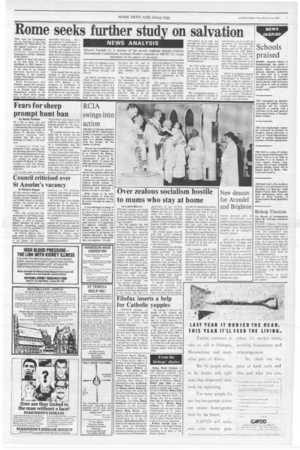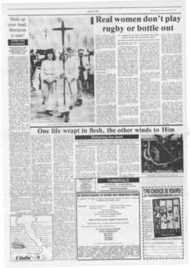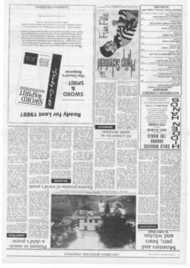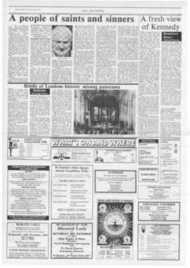Page 3, 25th November 1988
Page 3

Report an error
Noticed an error on this page?If you've noticed an error in this article please click here to report it.
Tags
Share
Related articles
Qualified Yes
Bishop Murphy-o'connor Co-chairs Arcic Ii
Vatican Dampener On Unity Progress
Burying The Hatchet In The Arcic Final Report
Arcic Endorsed
s further study on salvation THIS week the Congregation for
the Doctrine of the Faith published its Observations on the Agreed Statement of the second Anglican — Roman Catholic International Commission entitled Salvation in the Church.
ARCIC II chose this subject as its first piece of work (published in 1987) because it concerns the doctrine which was at the heart of the division between Catholics and Protestants in the sixteenth century. This was the doctrine of justification by faith.
Both Protestants and Catholics agreed that salvation is a free gift of God which comes to us through Jesus Christ. Disagreement centred on the way in which sinful human beings receive that gift. Are we
reconciled with God — this is the meaning of justification because he makes us good, or because God chooses to treat us as if we were good? Can we, with the help of grace, perform deeds which are pleasing to God and deserve a reward, or can we do no more than come before him empty-handed and accept his forgiveness with faith? What role does the Church play in this process?
It was agreed that we can do nothing to earn justification, which is a totally free gift from God, which we can only receive with faith. Baptism is the sacrament of justification. In justifying us, God does not simply pronounce us to be just, but makes us so. Consequently, once we are justified, God's grace makes us capable of living lives which are pleasing to him, and which he will reward in heaven. Justification comes to the Christian through the Church.
An ARCIC statement has no official authority unless it is confirmed by the whole Church, including the Holy Father. It is the Holy Father's duty to keep the whole Church faithful to the Gospel. The CDF is the Vatican Congregation which helps the Pope to fulfil this task. It therefore has the task of examining ecumenical agreements to ensure that they truly represent the Catholic faith.
The Observations consist of two documents. The first, a short statement of some 500 words, consists of the Congregation's "Observations" on the ARCIC statement on Salvation. This is the key document, which, is says, constitutes "an authorative
doctrinal judgement" It has been approved by the Holy Father. The second document, which does not carry the same formal authority, is a much longer official commentary on the Observations.
The report is "substantially positive". The Congregation approves of the way agreement has been reached about points which have been "classically controversial". The CDF wishes to "encourage" ARCIC in the
continuation of its task. But although the CDF judges that the statement can be understood in the Catholic sense, it is capable of being interpreted in less orthodox ways. Accordingly the CDF believes that it needs to be amplified in order to exclude misinterpretation.
The CDF wishes more to be said in the treatment on the Church about the place of the sacraments in the life of the justified Christian, and about the Church's role as "effective instrument" and not just a witness of salvation. It also calls for a fuller treatment of faith and grace.
The Congregation appears to commend ARCIC's method of getting away from past controversies, so as to seek an agreement in non-polemical terms which represent the present mind of the churches. Nevertheless the CDF desires "more rigorous doctrinal formulations, though not necessarily scholastic ones". It also wishes for attention to be paid to the official documents of the two churches, including the 39 Articles of the Anglicans.
ARCIC is at present engaged in a study of the Church seen as "Communion" or "fellowship." This study might be widened so as to take in some of the points the CDF calls for. Other points might be met if ARCIC II follows the examples of ARCIC II in publishing Elucidation which deal with questions raised by readers of its statements.
blog comments powered by Disqus













